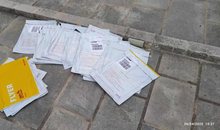
Businesses are being "socked" with Tirana Municipality taxes, they don't know what they are paying!

Many businesses in Tirana are facing a review of their local tax obligations, as a result of the change in the turnover limit, from zero to 2 million lek, which was previously increased to 2 to 8 million lek.
The Regional Tax Directorate for Local Fees and Taxes has conducted the review based on the information it received from taxes for 2024. The transition to this category has automatically burdened businesses with higher taxes and fees for cleaning and educational infrastructure taxes.
For example, the cleaning fee for businesses with a turnover of up to 2 million lek is 4 thousand lek per year, while for entities with a turnover of 2 to 8 million lek it is 11,500 lek per year.
Businesses that were subject to the review were mailed a letter last week informing them of another obligation for both 2024 and 2025, while they had paid the obligations for both 2024 and 2025, which according to the deadline is April 20 (2024 and 2025, respectively).
The main concern of businesses is not only the increase in liabilities, but the lack of clear information on their nature, as they have been sent two different invoices with the obligation to pay, one at the beginning of March and the other in May, for the annual obligation of the cleaning fee and the education tax.
Many entities do not know whether the new invoice they have been issued represents a new obligation due to the turnover revaluation, or is additional to an existing obligation.
In this specific case, between two tax invoices issued by the General Directorate of Local Taxes and Tariffs, the Directorate of Control and Evaluation for the same entity, on March 13 and May 1, 2025, shows a significant increase in the obligation without any clarification from the Local Taxes and Tariffs institution.
The subject in question wants to know whether this is a new obligation added after the revaluation of income, or whether the requested amounts also include old obligations, which were previously prepaid based on the 2023 turnover.
Even when they go to bank counters to obtain information, they are not given an explanation of the composition of the amount, but are simply asked to pay the total liability generated in the system.
Specifically, the March invoice to this entity contains only a liability amount of 6,500 lek, while the May invoice has a total liability of 20,876 lek, divided into three items: Tax liability for 2025 in the amount of 9,018.7 lek; Previous tax liabilities in the amount of 9,789.0 lek and Fine in the amount of 2,068.2 lek.
None of these invoices specify for which period these amounts were calculated, whether they represent new liabilities or previous revaluations.
While businesses are seeking clarity, the local Tariffs and Taxes institution is not providing any official communication to help them understand what they must pay and why.
"We have sent the request to the municipality for the verification of income for 2024, but so far we have not received any response. No review of the request has been made, and from what is understood, the procedures operate in a one-sided manner, examining only cases that lead to an increase in values, without really considering the income or changes that occur," one of the businesses claims for Monitor.
The Tirana Local Tax Directorate did not respond to Monitor's request to clarify the situation. Businesses themselves are also calling the counters, where they are asked to submit their concerns via email, but many entities complain that they do not receive a response.
How is the local tax liability calculated according to the turnover distribution?
According to decision no. 158, dated 26.12.2019 "On the approval of the system of local taxes and fees in the city of Tirana", the Educational Infrastructure Tax and Cleaning Fee is calculated as a fixed annual obligation, but varies according to the category of business turnover.
Temporary tax for educational infrastructure, for service unit businesses (which includes the above facility) for a turnover of up to 2 million lek, the obligation is 2,500 lek.
From 2 – 8 million lek, the obligation is 4,000 lek
Over 8 million lek is 17,000 lek.
So, for an entity that has moved from the category "up to 2 million" to "2–8 million lek", the tax has increased from 2,500 lek to 4,000 lek.
Cleaning tax, for service unit businesses (which includes the above facility) for a turnover of up to 2 million lek, the obligation is 2,500 lek.
From 2-8 million lek, the obligation is 11,500 lek
Over 8 million lek is 57,500 lek
So, for an entity that has moved from the category "up to 2 million" to "2–8 million lek", the tax has increased from 2,500 -4,000 lek to 11,500 lek.
The categorization of businesses for tax purposes is based on the turnover achieved in the previous year. This means that for 2025, the turnover of 2024 must be taken into account to determine the relevant local tax bracket.
Meanwhile, the categorization of businesses for the purpose of local taxes still remains unharmonized with the law "On Income Tax", where the net income of commercial and self-employed individuals is taxed progressively, at 15% up to 14 million lek and 23% for the amount above this threshold. This scheme aims to differentiate the tax burden according to the level of profit.
Experts: Fines and late fees for non-declaration are unfair
Adding to the confusion are the fines for failing to declare the change in turnover on time.
As a principle, our tax system is based on self-declaration and business income is declared through invoices in the tax system.
In the media, representatives of the Directorate of Local Tariffs and Taxes explained that based on the law "On Tax Procedures", the deadline for declaring changes in turnover to this directorate by entities is determined within 15 days, but without providing an explanation of how it is done, nor a standard form or official link where entities can follow the procedure.
So according to them, this change in turnover should have been self-declared by the entity to the local tax authorities for tax calculation purposes. Consequently, the time period from when this change occurred until the date the revaluation was made is considered a failure of the entity to do so and consequently it receives interest for the period, while the entity also faces the risk of having its bank accounts blocked by the Municipality.
But for experts, the law "On Tax Procedures" does not define the obligation of entities to change the turnover limit, since they make self-declarations through invoices and central taxes.
Legal auditor Julian Saraçi explains that imposing fines and interest on late payments is unfair, as businesses self-declare their income through invoices uploaded to the central tax system. According to him, it is the duty of institutions to coordinate changes in the turnover of entities at least every 6 months, as their turnover cannot be declared in some institutions.
Accounting experts have previously raised concerns about delays in coordination between regional tax directorates and local tax offices to reflect cases of turnover changes, which are often corrected by the entities themselves to tax inspectors.
Also at the end of last year, namely in the period 28-29 November 2024, many businesses in Tirana raised concerns about the unfair blocking of bank accounts by the Local Tax Directorate, without being previously notified of the additional obligations that arose after the increase in reference prices for the building tax. The businesses claimed that they had not been informed about the third installment through official channels, while the notifications on e-Albania were not visible as new obligations./ MONITOR
Latest news


Monika Kryemadhi appears at SPAK dressed in black
2025-05-05 13:24:47


SPAK files another charge against Ajola Xoxa, also accused of concealing income
2025-05-05 12:52:23
Sanctions and war tribunal on the agenda of EU ministers
2025-05-05 12:29:10
Rama insults and offends Bledjon Nallbatin: How can Democrats vote for a thug?
2025-05-05 12:21:41

May 5, National Martyrs' Day
2025-05-05 11:50:22

Kurti invites LDK for coalition with LVV
2025-05-05 11:37:27

Young man disappears in Tirana
2025-05-05 11:14:39

Facebook campaign: Profiles from Vietnam like "Team Edi Rama" posts
2025-05-05 10:52:24
The Special Court leaves Florenc Çapjan in prison, the testimony is revealed
2025-05-05 10:38:24
Fatal accident in Shkodra
2025-05-05 10:25:30
Gunfight in Laç/ One of the injured in serious condition
2025-05-05 10:19:06





Appears in SPAK Sali Berisha
2025-05-05 09:08:23
Përtej gallatës dhe nofkave, çfarë ofron politika për ekonominë
2025-05-05 08:52:58
A 28-year-old wanted by Spain for drug trafficking is arrested in Vau i Dejës
2025-05-05 08:42:24

Rain is back! Weather forecast for today
2025-05-05 08:20:40
Posta e mëngjesit/ Me 2 rreshta: Çfarë pati rëndësi dje në Shqipëri
2025-05-05 08:01:22

Makina përplas motorin në aksin Shkodër-Lezhë, plagosen dy adoleshentë
2025-05-04 21:29:50


Video/ The moment when the police forcibly drag away the DP candidate in Fier
2025-05-04 20:47:17
Berisha: We ask for 100 days from Albanian citizens to transform Albania
2025-05-04 20:38:25



"In the owl sleeps a vigilant fate..."/ Chris LaCivita openly criticizes Rama
2025-05-04 19:09:01
UEFA fines Real Madrid
2025-05-04 18:45:40

Habit Putin: I hope there will be no need to use nuclear weapons in Ukraine
2025-05-04 17:55:59
A 37-year-old man is found dead in the Port of Shëngjin
2025-05-04 17:32:32
Serious accident in Croatia, 2 dead and 31 injured
2025-05-04 17:17:05
Useful during the summer, here are the vitamins you should take
2025-05-04 17:03:11





Forza Italia MP calls on Albanians: Vote for democracy with Europe in mind
2025-05-04 15:18:00
Eurostat: Albanian women rank first in the region for coding programs
2025-05-04 15:01:35











Video/ Berisha is given a grand reception in Tropoja
2025-05-04 11:27:26
'Great Albania' tops the poll of the popular social media site
2025-05-04 11:08:20


Collision with truck driver, brother of candidate for deputy in Korça arrested
2025-05-04 10:04:30
Analysis of the May 11 elections: Facade campaign with little substance
2025-05-04 09:43:53
Art in mourning! Renowned actor and director Eduart Çala passes away
2025-05-04 09:13:46
Yesterday's gunfight in Laç, young man dies overnight in hospital
2025-05-04 08:54:45
Astrological forecast, May 4, 2025
2025-05-04 08:37:03

Morning Post/ In 2 lines: What mattered yesterday in Albania
2025-05-04 07:59:41




Vlora reserves a grand welcome for Sali Berisha
2025-05-03 20:38:35
Couples who sleep in different beds are happier, here's why
2025-05-03 20:20:24


Albanian tries to open plane door during Geneva-Pristina flight
2025-05-03 19:20:19


Noka meeting in Tirana: Vote for PD-ASHM, so that we repopulate Albania
2025-05-03 18:31:03


The mineral massif in Klos collapses, taking a quarry with it
2025-05-03 17:37:21
5 people injured in Laç, crime weapon found
2025-05-03 17:20:43

Two of the injured in Laç in serious condition
2025-05-03 16:40:30
Vučić cuts short US visit, hospitalized in Serbia
2025-05-03 16:22:30
DP-ASHM/Memelli Program: Feasible, economic dignity for every individual
2025-05-03 16:02:07


Details/ Shooting in Laç, names of 5 injured
2025-05-03 15:09:52

Gunfire in Laç, 4 people injured
2025-05-03 14:46:56
